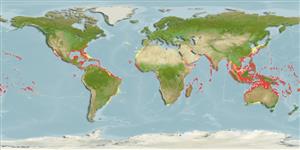Common names from other countries
Classification / Names / Names
Common names | Synonyms | Catalog of Fishes (gen., sp.) | ITIS | CoL | WoRMS
Environment: milieu / climate zone / depth range / distribution range
Ecology
Sessile; brackish; depth range 0 - 70 m (Ref. 83908). Tropical
Atlantic Ocean: from the west coast of Florida, USA to the Caribbean, including Gulf of Mexico, south to Brazil, east to Canary Islands and south to São Tomé & Príncipe; Indian Ocean: from Yemen to Kwazulu Natal, South Africa, including Madagascar, Seychelles, Aldabra, east to India and south to Dampier Archipelago, Western Australia including the Andaman, Chagos Archipelago and Diego Garcia Atoll; Pacific Ocean: from Japan to the South China Sea and south to Queensland, Australia including Federated States of Micronesia, east to American Samoa.
Length at first maturity / Size / Weight / Age
Maturity: Lm ? range ? - ? cm
Thallus consists of a horizontal branched stolon and feather-like erect branches. Upcurved cylindrical pinnules are pinnately or distichously arranged along the side of the distal portion of
branch axes and sometimes tristichously arranged at the lower or basal portion of the erect branches. Erect branches up to 10 cm in height (Ref. 80758).
Used for human consumption as food and medicine: antifungal, lowers blood pressure (Ref. 80758). Maximum depth from Ref. 102144.
Guiry, M.D. and G.M. Guiry. 2009. (Ref. 80701)
IUCN Red List Status (Ref. 130435: Version 2024-1)
CITES status (Ref. 108899)
Not Evaluated
Not Evaluated
Threat to humans
Human uses
Fisheries: commercial
| FishSource |
Tools
More information
Age/SizeGrowthLength-weightLength-lengthMorphologyLarvaeAbundance
Internet sources
Estimates based on models
Preferred temperature
(Ref.
115969): 23.4 - 29, mean 27.4 (based on 2022 cells).
